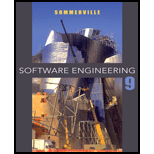Sorry! We don’t have solutions for this edition yet.
Solutions are available for other editions of this book
View 10th Edition solutionsarrow_forwardBook Details
Table of Contents Contents Part 1 Introduction to Software Engineering Chapter 1: Introduction 1.1 Professional software development 1.2 Software engineering ethics 1.3 Case studies Chapter 2: Software processes 2.1 Software process models 2.2 Process activities 2.3 Coping with change 2.4 The Rational Unified Process Chapter 3: Agile software development 3.1 Agile methods 3.2 Plan-driven and agile development 3.3 Extreme programming 3.4 Agile project management 3.5 Scaling agile methods Chapter 4: Requirements engineering 4.1 Functional and non-functional requirements 4.2 The software requirements document 4.3 Requirements specification 4.4 Requirements engineering processes 4.5 Requirements elicitation and analysis 4.6 Requirements validation 4.7 Requirements management Chapter 5: System modeling 5.1 Context models 5.2 Interaction models 5.3 Structural models 5.4 Behavioral models 5.5 Model-driven engineering Chapter 6: Architectural design 6.1 Architectural design decisions 6.2 Architectural views 6.3 Architectural patterns 6.4 Application architectures Chapter 7: Design and Implementation 7.1 Object-oriented design using the UML 7.2 Design patterns 7.3 Implementation issues 7.4 Open source development Chapter 8: Software testing 8.1 Development testing 8.2 Test-driven development 8.3 Release testing 8.4 User testing Chapter 9: Software Evolution 9.1 Evolution processes 9.2 Program evolution dynamics 9.3 Software maintenance 9.4 Legacy system management Part 2 Dependability and Security Chapter 10: Socio-technical Systems 10.1 Complex systems 10.2 Systems engineering 10.3 System procurement 10.4 System development 10.5 System operation Chapter 11: Dependability and Security 11.1 Dependability properties 11.2 Availability and reliability 11.3 Safety 11.4 Security Chapter 12: Dependability and Security Specification 12.1 Risk-driven requirements specification 12.2 Safety specification 12.3 Reliability specification 12.4 Security specification 12.5 Formal specification Chapter 13: Dependability Engineering 13.1 Redundancy and diversity 13.2 Dependable processes 13.3 Dependable systems architectures 13.4 Dependable programming Chapter 14: Security Engineering 14.1 Security risk management 14.2 Design for security 14.3 System survivability Chapter 15: Dependability and Security Assurance 15.1 Static analysis 15.2 Reliability testing 15.3 Security testing 15.4 Process assurance 15.5 Safety and dependability cases Part 3 Advanced Software Engineering Chapter 16: Software Reuse 16.1 The reuse landscape 16.2 Application frameworks 16.3 Software product lines 16.4 COTS product reuse Chapter 17: Component-based Software Engineering 17.1 Components and component models 17.2 CBSE processes 17.3 Component composition Chapter 18: Distributed Software Engineering 18.1 Distributed systems issues 18.2 Client—server computing 18.3 Architectural patterns for distributed systems 18.4 Software as a service Chapter 19: Service-oriented Architecture 19.1 Services as reusable components 19.2 Service engineering 19.3 Software development with services Chapter 20: Embedded Systems 20.1 Embedded systems design 20.2 Architectural patterns 20.3 Timing analysis 20.4 Real-time operating systems Chapter 21: Aspect-oriented software engineering 21.1 The separation of concerns 21.2 Aspects, join points and pointcuts 21.3 Software engineering with aspects Part 4 Software management Chapter 22: Project management 22.1 Risk management 22.2 Managing people 22.3 Teamwork Chapter 23: Project planning 23.1 Software pricing 23.2 Plan-driven development 23.3 Project scheduling 23.4 Agile planning 23.5 Estimation techniques Chapter 24: Quality management 24.1 Software quality 24.2 Software standards 24.3 Reviews and inspections 24.4 Software measurement and metrics Chapter 25: Configuration management 25.1 Change management 25.2 Version management 25.3 System building 25.4 Release management Chapter 26: Process improvement 26.1 The process improvement process 26.2 Process measurement 26.3 Process analysis 26.4 Process change 26.5 The CMMI process improvement framework
More Editions of This Book
Corresponding editions of this textbook are also available below:
Software Engineering >INTERNATIONAL EDITION <
9th Edition
ISBN: 9780137053469
EBK SOFTWARE ENGINEERING
10th Edition
ISBN: 8220101455970
EBK SOFTWARE ENGINEERING
10th Edition
ISBN: 9780133943238
Pearson eText for Software Engineering -- Instant Access (Pearson+)
10th Edition
ISBN: 9780137503148
Software Engineering (10th Edition)
10th Edition
ISBN: 9780133943030
Software Engineering, 10th Edition
10th Edition
ISBN: 9789332582699
Software Engineering, Global Edition
10th Edition
ISBN: 9781292096131
Software Engineering / 7th Edition
7th Edition
ISBN: 9788177585308
Related Computer Science Textbooks with Solutions
Still sussing out bartleby
Check out a sample textbook solution.
